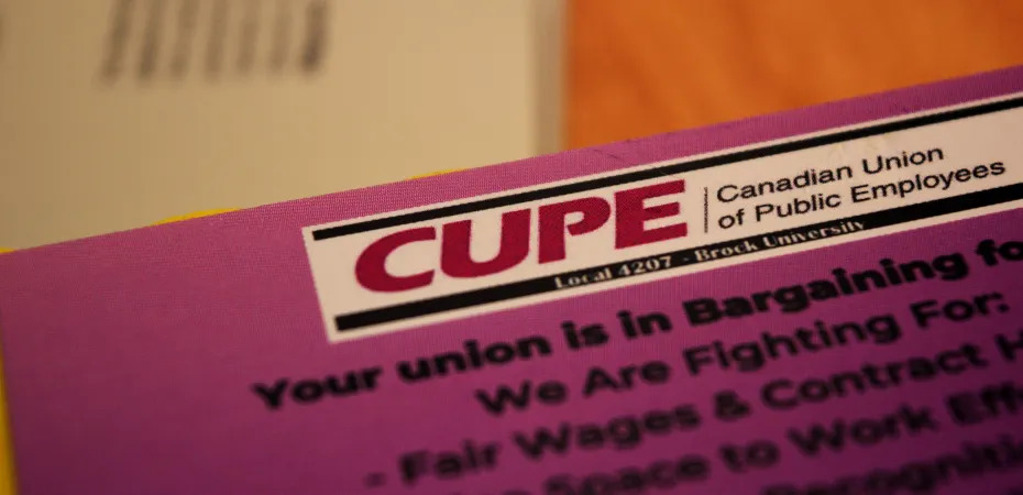CANADA: ONTARIO CUPE STRIKE GOES AHEAD DESPITE BEING OUTLAWED
Thousands of CUPE members went on strike outside of the Queen’s Park Legislative Building alongside supporters on Friday, Nov. 4 as a result of Doug Ford making it illegal for the strike to happen.
In passing the Keeping Students in Class Act, the Ontario progressive conservatives have evoked the notwithstanding clause in order to be absolved from aspects of the Charter of Rights and Freedoms for a five-year period. In doing this, Ford has forced CUPE into a contract that makes striking illegal wherein members are fined $4000 a day and the union is fined $500,000 for every day a strike is held. Despite this, the union still plans on continuing to strike.
The average education worker — whom CUPE represents — makes a salary of $40,000 a year which has been inadequate relative to the cost of living in Ontario, especially as inflation has wreaked havoc for the past year.
Doug Ford’s cabinet continues to undermine essential workers in healthcare and education. Bills 124, 115 and now this Act all undermine essential worker’s wages, rights and ultimately their quality of life.
U.S.A.: MIDTERMS SHOW THREAT OF BEING A REPUBLICAN WIN
Voting closes for the States’ midterms on Nov. 8.
Signs are showing this may be a win for the republican party. It is a well observed phenomenon that midterms tend to sway to the party opposite the president. On top of this, according to an ABC News Ipsos poll, Americans rank the issue of inflation as being a much stranger decider on their vote over the issue of abortion, which has become a hot button issue since the U.S. Supreme Court repealed Roe v. Wade over the summer.
The Republican playbook has been fairly simple here. Inflation can be spun as a direct result of Washington’s “reckless” spending habits, where Biden’s Inflation Reduction Act is the main culprit. Corporate price gouging and global supply chain issues are often altogether ignored by Republican House runners as their modus operandi is corporate tax cuts and “unleashing” the market; greed and global contingency don’t figure into how free market zealots propose progressive action.
All in all, Congress and the Senate turning red is worrisome, especially as former President, Donald Trump is expected to run again in 2024.
INTERNATIONAL: LULA WINS IN BRAZIL
In more positive news, Brazil has elected former political prisoner, 77-year-old Lula Da Silva, to be their president after Jair Balsonaro lost in a second round of voting on Oct. 31.
Lula is the leader of the PT party and in his first term as president which lasted from 2006 to 2010, he lifted a significant amount of Brazilians out of poverty, halved the child malnutrition rate in the country, avoided serious financial damage from the global economic collapse of 2008 and built new and effective water infrastructure that gave easy access to the essential resource to millions of Brazilians.
Due to his progressive record on a variety of issues, but most importantly climate and the Amazon Rainforest, there’s a sense of optimism in terms of climate change and deforestation now that Lula is in office.
Though he has conceded to the loss now, Bolsanaro was quiet for a few days after the election, seemingly taking the Trumpian approach of denying the election results. As a result, riots erupted across Brazil over alleged election fraud and truckers, who seemingly took a page out of the Convoy Protest in Canada, blocked highways and lit fires to protest the results. However, Bolsanaro finally conceded by telling Supreme Court incumbents “it’s over.”
Lula’s win means a win for not only labour but the human race.
THEORETICAL CONSIDERATIONS: JODI DEAN AND THE CROWD TURNED PARTY
Jodie Dean is an author and professor of political science at the Hobart and William Smith colleges in New York state.
A highly-active leftist, Dean’s theoretical tenure has seen an importing of a Marxist critique onto our highly service-based neoliberal economy, even going so far as to say that the current political choice is communism or the current “Neo Feudalism.”
Dean’s 2016 work, Crowds and Party, lays out a theoretical argument for how the subject of the disruptive crowd is subversive to capitalism but ultimately needs the form of a political party to articulate and institute this subject into the political realm to enact serious change that favours the people.
Crowds, according to Dean, are an aimless mass where individual subjectivity breaks down, thus inherently dismantling the interpellation of capitalist rhetoric — “you’re an individual with unique tastes! Now buy our product”—which posits us as atomistic individuals with privileged, private subjectivities. The crowd replicates Lacan’s theory of desire: infinite deferral, pulsive, aimless—essentially the means being the end. This means the crowd is ultimately libidinally charged; one begins to not care about bumping into others and the result is that no one individual can resist this charged crowd, only a few individuals can be handmaidens to the crowd’s demands—Dean calls these select few, following the work of Elias Canetti, the crowd form’s crystal figures.
Think of the setup of a concert with the performers as being the crystal formed by and for the crowd, which is ironic given that capitalist discourses often want to deify and paint musicians as innovators who found a market to fill in and thus are rulers over the crowd. It’s actually the opposite case.
The problem, however, is that the crowd eventually dissipates and so does the libidinally instantiated “shared intensity of belonging.” Thus, with the dissipation of the crowd there’s a reemergence of inequality. This is precisely why, argues Dean, the crowd needs the political party with leaders to actualize the crowd’s pressure into political action
The crowd eventually dissipates but the party that represents it will remain. Dean envisions this effective transference between crowd and party as the means to a revolution that will vindicate the objective failures of 20th century communist projects.

